Cinegy Desktop User Interface
Reading time ~4 minutes
The Cinegy Desktop user interface follows Windows desktop metaphor wherever possible to make it more intuitive and easy to use.
Main Toolbar

The main toolbar contains the most used features of Cinegy Desktop. These are:
-
Undo – undo one or more actions.
-
Redo – redo one or more actions.
-
Search – open the Cinegy Search tool.
-
Root – open the Cinegy Archive root in a new window.
-
Navigator – navigate to files on your PC and network.
-
Modules – a categorized list of all available plug-ins and windows.
-
Layouts - accesses a list of layout templates for the current user profile, as well as layout controls.
-
MRU – a list of most recently opened items, such as bins and Rolls, with icons for easy item type identification.
-
Help – opens a help file.
-
Tool Menu – accesses further functions of the menu bar.
-
Minimize – minimizes the Cinegy Desktop window.
-
Close – closes the Cinegy Desktop window.
Window Arrangement Commands
The window arrangement commands can be found as buttons in the toolbars or in the window menu.
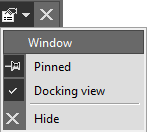
|
Note
|
Some Cinegy Desktop windows do not offer all window arrangement commands by design. |
Dock Window
|
Choose the "Docking View" command from the "Window menu" button. The docked window will "stick" to the borders of the screen. |
Pin Window
Some of the Cinegy Desktop windows have the "Pin" button in the caption. The feature allows you to fix the window size and position on the screen.
|
Press the "Pin" button to fix the size and position of the windows on the screen. |
|
You can also use the "Pinned" command from the "Window menu" icon. |
If a window is not pinned, it will roll down automatically after a few seconds. To open it, simply move the mouse pointer over its caption. The window will unroll and you can work with it; move the mouse pointer outside the window and it will roll up again.
Hide Window and Close the Cinegy Desktop Plug-in
|
Select "Hide" from the "Window menu" button of the currently opened window. The window will disappear from the screen. |
|
You can also use the "Hide" command from the "Window menu" icon. |
To bring it back to the screen, select the relevant window in the "Modules" drop-down menu in the main toolbar.
|
The "Exit" command in the main toolbar closes Cinegy Desktop. |
Roll-Up Window
|
Some of the Cinegy Desktop windows (for example, bins and Clip Viewer) allow you to roll them up (minimize), so that only the floating caption will remain on the screen. Press the "Roll-up" button to minimize the window. |
Full Screen Mode
|
Some of the Cinegy Desktop windows (for example, bins and Clip Viewer) allow full-screen (maximized) mode. Press the "Full Screen" button to maximize the window. |
|
When in full-screen mode, the window has the "Restore" button. Press this button to restore the window to its original size and position. |
|
Note
|
You can also switch between window modes by double-clicking the window caption. |
Undoing and Redoing
|
The "Undo" and "Redo" buttons are located in the main toolbar. |
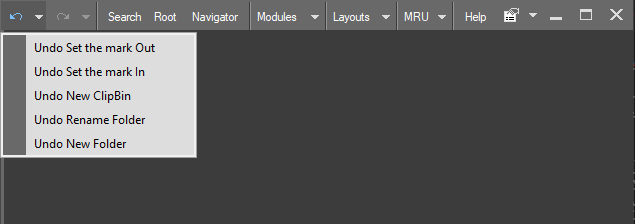
These functions provide the named list of the last actions; the latest is positioned at the top. If you select, for example, the third item from the list, all actions up to your selection, will be undone/redone.
|
Note
|
The depth of the undo is 99 levels. Due to the collaborative nature of Cinegy Desktop, when working together with several people on the same bin, the undo list might be shorter than you expected because of the simultaneous changes to the bin from different workstations. |
Main Tool Menu
The commands found in the toolbar as well as a few additional commands can also be found in the Cinegy Desktop main tool menu:
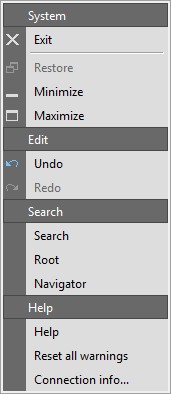
System Commands
The "System" command "Exit" closes the application window. Use the "Minimize" command to minimize the application window to the task bar of your operating system. To enlarge the application window to fill the screen, use the "Maximize" command. When the application is open and maximized, use the "Restore" command to return to the previous window size.
Edit Commands
The "Edit" commands, undo and redo, operate as described earlier.
Search Commands
The "Search" commands open the search, root or navigator windows.
|
Important
|
These are explained in detail in the Search section. |
Help Commands
There are three "Help" commands:
-
Help – open the Cinegy help file.
-
Reset all warnings – reactivate the confirmation windows when the "Do not show again" checkbox has been selected. This checkbox is usually displayed when you perform such actions as deleting items:
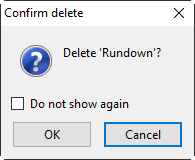
-
Connection info… – opens the following information window:
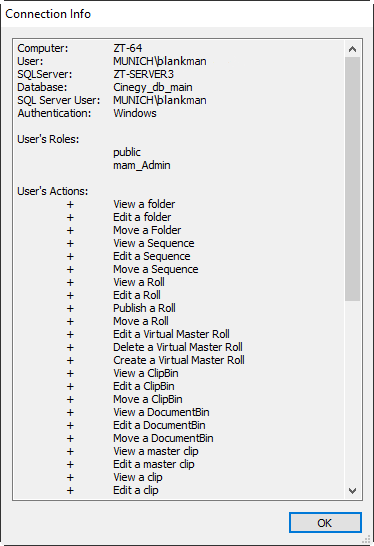
Here you will see all the useful information about the current user, such as the user and computer names, the Cinegy Archive server and databases in use.
The "User’s Actions" list shows a list of all the actions the current user can perform. It depends on the specific rights assigned to a user.






